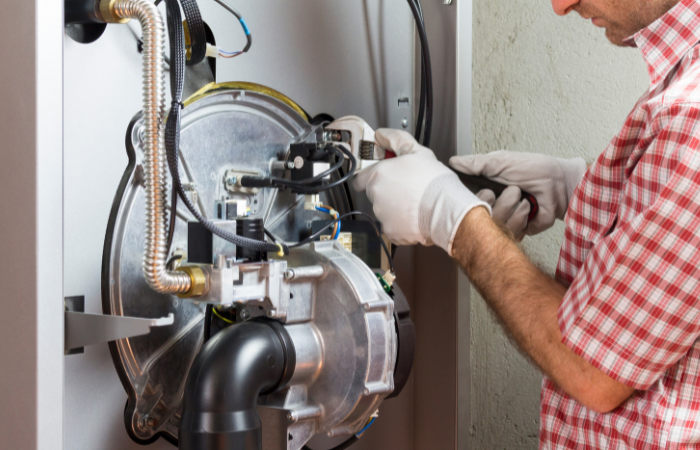It’s that time of year again! The leaves are changing colours, the days are getting shorter, and before you know it, winter will be here. That also means it’s time for your annual boiler maintenance check-up. A boiler maintenance checklist is the best way to make sure your boiler is running smoothly and efficiently all winter long.
If your gas boiler in Linwood isn’t maintained properly over the years, it can lead to several problems, such as:
- Higher heating bills
- Frequent repairs
- Shortened lifespan
- Carbon monoxide leaks
- Inefficiency and higher emissions`
Carrying out regular maintenance checks on your boiler can help to identify any potential problems at an early stage before they have a chance to cause serious damage. It can also help to keep your energy bills down, as a well-maintained boiler will be more efficient than one that isn’t.
So, what kind of maintenance should you be carrying out on your boiler before winter starts? Here’s an annual boiler maintenance checklist to help you get started:
Clean the Boiler and Its Surrounding Area
The boiler and its surrounding area need to be cleaned. This will help to ensure that the boiler operates efficiently and safely.
First, turn off the power to the boiler.
Next, remove any debris or dirt from around the boiler.
Then, use a brush and cleaning solution to clean the exterior of the boiler.
Finally, clean the area around the boiler to remove any dirt or debris that could potentially cause problems.
Check for Leaks or Corrosion
Check for any leaks or corrosion of pipes and fittings. Also, inspect the septic tank for any cracks or other damage.
If you notice any of these problems, it’s important to have them fixed as soon as possible to avoid further damage to your home or business.
Inspect the Heat Exchanger for Cracks or Damage
Check for leaks and repair or replace them as necessary. Also, check the operation of the unit’s controls and make sure they are functioning properly. Clean any accumulated dirt or debris from the heat exchanger to ensure proper airflow.
If you notice any cracks or damage to the heat exchanger, it is important to have them repaired or replaced.
Flush Out the Boiler System and Check for Any Blockages
If you have a boiler system, it’s important to regularly flush out the system to prevent any build-up of dirt or debris. You can do this by running a garden hose through the system, or by using a specialised flushing device. Be sure to check for any blockages before restarting the system.
Check The Gas Pressure and Adjust It If Necessary
If the pressure in your gas line is too high or too low, it can cause problems with your appliances. To check the pressure, you will need a pressure gauge. Most home improvement stores sell these.
Attach the pressure gauge to the gas line leading to your appliance. Turn on the gas and read the pressure on the gauge.
If the needle falls below 1, it means that the boiler’s water pressure is too low. This could be due to a leak in the system, which will need to be fixed as soon as possible.
Check the boiler’s temperature regularly If it starts to rise above 120 degrees, there could be a problem with the thermostat or another component in the system.
Test The Safety Devices to Make Sure They Are Working Properly
Some of the boiler safety devices are safety valves, low or high-water-level alarms, water-level indicators, pressure gauges, etc. It is important to test each of these safety devices to make sure they are working properly.
Make Sure the Chimney Is Clear and Free of Obstructions
If you have a gas or oil furnace, check the flue pipe to make sure it is clear and free of obstructions. If you have a wood-burning fireplace, make sure the chimney is clear and free of obstructions. Regular maintenance will help to prevent problems and keep your fireplace in good working order.
Check Boiler’s Pilot Light and Controls
Check the pilot light regularly. If it goes out, it could indicate a problem with the gas supply or ventilation.
Also, check the boiler’s controls regularly. Make sure that they are working properly and that all the settings are correct.
If you carry out these checks regularly, you can help to keep your boiler in good working order and minimise the risk of it breaking down. If you do find any problems, make sure you get them fixed as soon as possible by a qualified engineer.
Schedule An Annual Boiler Maintenance Check-Up with A Gas-Safe Engineer
If you have a gas or oil boiler, it’s important to have it serviced regularly by a Gas-Safe Engineer in Linwood. A yearly check-up can help make sure your boiler is running safely and efficiently. Regular maintenance can also extend the life of your boiler, help you avoid costly repairs, and keep your energy bills low.
If you’re not sure how often to have your boiler serviced, check with the manufacturer or your local utility company. They may have recommendations for how often to schedule maintenance. And be sure to keep good records of when your boiler was serviced, so you can keep track of how often it’s been done.

